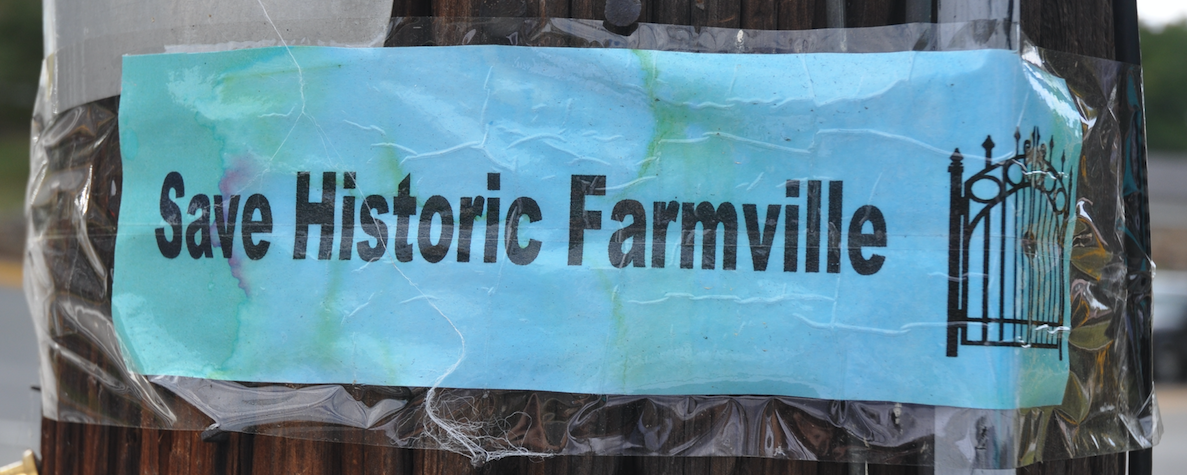‘A cataclysmic change’
Published 3:25 pm Thursday, October 5, 2017


Editor’s Note: On Sept. 22, The Herald sat down for an interview with members and supporters of Farmville: This Place Matters — a newly founded group formed in response to two controversial rezoning requests in Farmville. This is the second of a two-part series from that interview.
Opponents of the controversial Martin and Walk2Campus rezoning requests say if the proposals are approved — which could result in the razing of numerous homes and the erection of student apartment complexes — the historic designation that encompasses homes and businesses in the area could be removed by state or federal authorities.
“There is a possibility that when you lose a certain number of contributing structures within that historic district that you could lose that designation which then would prevent people from availing themselves to the historic tax credits for purposes of renovation,” said Harlan Horton, a member of Farmville: This Place Matters, a new group that’s stemmed from the proposals while promoting smart growth and planning in town. “A lot of investment has gone into this community because of historic tax credits,” Horton said, citing the development of the bank building at the intersection of Third and Main streets that houses apartments and the Longwood University bookstore benefitting from the designation.
Trending
“We have to be very careful from a planning perspective and from an investment in the community perspective of changes within that district,” Horton said.
The Wednesday action of the Farmville Town Council to issue a request for proposals (RFP) for an outside consultant to assist the town in updating its comprehensive plan and reviewing and proposing amendments to the town’s zoning ordinance followed a contentious Sept. 29 planning commission meeting where members unanimously voted to table the two controversial rezoning requests from Robert and Sherry Martin and Walk2Campus Holdings LLC (see story on A1).
Last week’s action by the planning commission followed 27 people who spoke against the projects — citing quality-of-life issues, noise, the historic nature of the area, parking, trash, traffic, the precedent the rezoning could set and density levels.
The recommendation to table the requests — which have drawn feverish opposition — came from Town Manager Gerald Spates following the public comment portion of the Sept. 27 meeting, where planners were poised to vote to hold public hearings on the requests.
The Martins are requesting to rezone their just more than an acre of property they own at the intersection of High, Oak and Appomattox streets for a proposed five-story, 95,000-square-foot student apartment complex from R-3 Residential to R-3A Residential, while Walk2Campus Holdings LLC President and CEO Matthew King is seeking to rezone 37 of his firm’s student housing properties to R-3A Residential.
The Martins’ request includes repealing the density level maximum of 10 units per acre for the R-3A Zone to allow for the proposed 195-bed apartment complex. The R-3A Zone is the same that Longwood University’s main campus is classified as.
Trending
“It’s a part of our identity,” Horton said of the historic homes. “Our identity is that we value things, architecture, beautiful things that have been here for a long time. It’s who we are as a community,” Horton said.
According to an application titled “National Register for Historic Resources” on the Virginia Department of Historic Resources’ website, the designation was made in 1989.
“The three distinct residential areas of the district — the neighborhood bounded by High, Beech, Randolph and Grove streets; the western High Street corridor; and the area concentrating on First and Second avenues — contain a variety of dwellings, churches and schools reflecting the architectural tastes of the past 150 years,” the application notes. “…The historic district is a well-preserved assemblage of buildings that best represents Farmville’s nearly 200-year history.”
Farmville: This Place Matters — the name of the group — has almost 400 followers on social media, according to Dan Mossler, one of the leaders of the new group.
“By default in the Town of Farmville, we have high-density apartment complexes sort of on the edges of town in areas where there is more green space,” Horton said. “You know, they talk about these Longwood high-rise buildings down here are tall buildings and how this is going to be somehow similar to it. There’s green space all around (the high-rises). There won’t be an inch of green space on that one,” Horton said, noting concrete and asphalt would surround the Martin project. “Where will the trees be? There won’t be room to plant a tree.”
“I don’t feel good about that,” said Julie Ross, who lives in a house built in the 1850s on Buffalo Street, about the prospect of living amid more saturated student housing. “For me, I think also we’re focusing on the Martin project — which is hideous itself — but it’s the big picture. What is being proposed is a change in density. All residential areas, it’s 10 units per acre. The Martins and Walk2Campus are asking for that to be lifted, which means anybody can come in and do that,” she said.
“You are changing the law. Walk2Campus and the Martins are asking us to change the law for their financial benefit. It’s not good for anybody but them. Zoning is a law.”
Ross contended Longwood didn’t need additional student housing. “There is apartments for rent up there, there’s apartments for rent on Oak Street, there’s apartments for rent down there. In the whole 10 years I’ve lived here I don’t ever remember seeing student housing not filling up.”
“It would be a shame (for the Martins to) tear down that beautiful house — but that they could do. They’re asking us and Matt King is asking us to change the zoning law,” Ross said.
She called removing the existing density levels “a cataclysmic change.”
“What’s the benefit of the town?” Mossler, who lives at the intersection of Appomattox and Buffalo streets, said regarding the proposals. “We know what the benefit is for the Martins and Walk2Campus, but what is this going to do for the town? That’s a question I haven’t heard them address.”
Horton said everything that was happening “is making the argument that the Town of Farmville needs an ordinance that addresses the historic district. We need to have something in this community that provides some protection for the value that is inherent in a historic district and in historic properties. There is value here,” he said.







